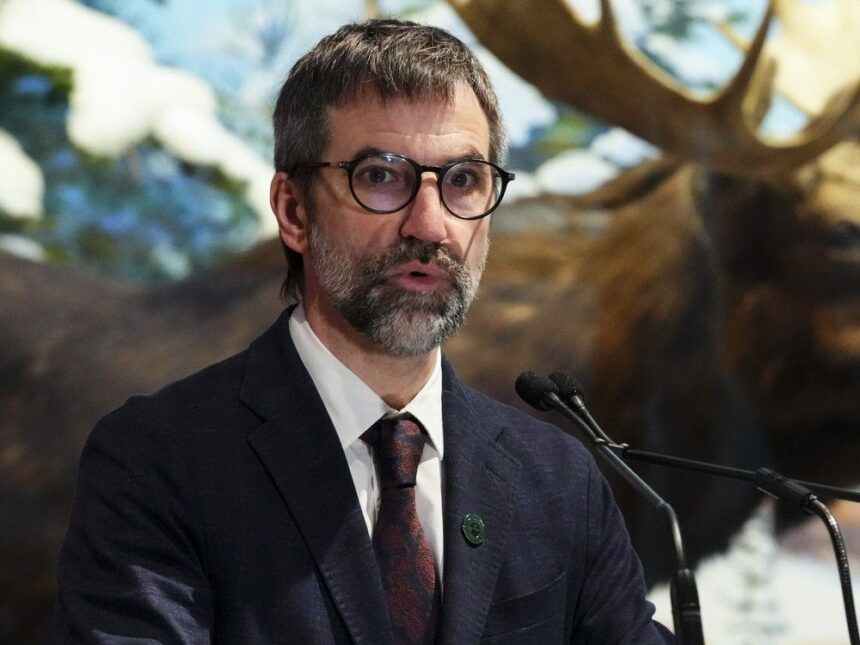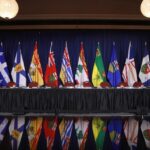As I watched Environment Minister Steven Guilbeault field questions at a community forum in Mississauga last week, the tension in the room was palpable. What began as a discussion on climate policy quickly evolved into a heated exchange about what it means to be Canadian in 2024.
“We cannot separate environmental policy from our national identity,” Guilbeault told the crowd of about 80 residents. “The decisions we make today reflect who we are as Canadians and what we value.”
The minister’s comments come amid growing national discourse about Canadian identity, a conversation that has intensified following Statistics Canada’s recent demographic projections showing Canada’s population could reach nearly 57 million by 2068, largely through immigration.
For Marjorie Chen, a small business owner who attended the forum, the issue strikes close to home. “I came here 15 years ago because of what Canada represented – opportunity balanced with compassion. Now I worry we’re losing sight of what makes this country special,” she told me after the event.
This sentiment reflects a broader anxiety. According to a recent Angus Reid poll, 67% of Canadians believe the country is experiencing an identity crisis, up from 58% in 2019. The poll found concerns crossing partisan lines, though with significant regional variations.
“The West feels increasingly alienated from Ottawa’s vision,” explains Dr. Samantha Rowe, political scientist at the University of Alberta. “It’s not just about policies anymore – it’s about fundamentally different visions of what Canada should be.”
Guilbeault’s position represents the Liberal government’s perspective that Canadian identity is adaptable and evolving. “Our strength has always been in our diversity and ability to change,” he stated, citing Canada’s environmental leadership as part of its modern global identity.
This view contrasts sharply with Conservative Leader Pierre Poilievre’s recent statements emphasizing traditional values and national sovereignty. At a Regina rally last month, Poilievre declared, “Canada needs to reclaim its identity as a nation that values hard work, personal responsibility, and our unique heritage.”
The identity debate extends beyond partisan politics into everyday Canadian life. In Markham, Ontario, city council meetings have become forums for passionate debate about development, immigration, and community character.
“Ten years ago, we discussed zoning and property taxes,” notes Councillor Jasmine Singh. “Now residents want to talk about what kind of community we’re becoming. These are existential questions, not administrative ones.”
Economic factors are feeding this national soul-searching. Recent data from the Canadian Centre for Policy Alternatives shows middle-class wages stagnating while housing costs have risen 43% nationally since 2019. For many, financial pressure has translated into questioning the country’s direction.
Michael Thompson, a construction worker from Edmonton I spoke with by phone, expressed frustration: “My father could afford a house and support a family on one income. I work overtime and can barely make rent. Something’s broken in the Canadian dream.”
The housing crisis in particular has become a flashpoint in the identity debate. In Vancouver, where the average home price exceeds $1.2 million according to the Canadian Real Estate Association, community forums often feature heated discussions about foreign investment, development, and who gets to call Canada home.
Indigenous perspectives add crucial depth to this conversation. “It’s ironic to hear debates about Canadian identity without acknowledging whose land this is,” noted Anishinaabe activist and writer Jennifer McLeod at a recent University of Toronto panel. “True Canadian identity must reckon with both our colonial past and reconciliation future.”
Environmental policy – Guilbeault’s portfolio – has become unexpectedly central to identity questions. His controversial Bill C-69, updating environmental assessment processes, was framed by supporters as protecting Canadian natural heritage and by opponents as threatening resource-sector jobs that many consider foundational to Canadian identity.
The identity conversation is playing out in our cultural institutions as well. The Canadian Museum of History reports attendance up 18% this year, with visitors spending significantly more time in exhibits exploring national identity. Museum director Caroline Desmarais notes, “People are searching for context to today’s debates in our shared history.”
Social media has amplified these tensions. An analysis of Twitter conversations using the hashtag #CanadianIdentity shows a 340% increase in usage over the past year, with highly polarized discourse. Researcher David Moscrop from the University of Ottawa cautions that “these platforms often reward the most extreme voices, distorting what’s actually a nuanced national conversation.”
As I left the Mississauga forum, I spoke with retired teacher William Leblanc, who offered perhaps the most balanced perspective: “Canada has always been reinventing itself. My parents worried about the same things in the 1970s. The fact we’re having this debate openly is itself something distinctly Canadian.”
The conversation about Canadian identity will likely intensify as we approach the next federal election. What remains clear is that the question of who we are as a nation resonates deeply with Canadians across regions, generations, and political affiliations. The answer, like Canada itself, continues to evolve.






